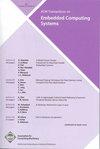基于移动设备的鲁棒室内定位异构弹性联邦学习
IF 2.6
3区 计算机科学
Q2 COMPUTER SCIENCE, HARDWARE & ARCHITECTURE
引用次数: 2
摘要
室内定位在应急响应、仓库管理和增强现实体验等应用中发挥着至关重要的作用。通过在移动设备上部署基于机器学习(ML)的室内定位框架,用户可以在各种室内和地下环境中进行自我定位。然而,由于移动设备硬件和软件堆栈的异质性,实现准确的室内定位可能具有挑战性,这可能导致位置估计不一致和不准确。传统的机器学习模型也严重依赖于初始训练数据,这使得它们在室内环境的动态变化中容易受到性能下降的影响。为了解决设备异构和缺乏适应性带来的挑战,我们提出了一种新的嵌入式ML框架,称为FedHIL。我们的框架结合了室内定位和联邦学习(FL),以提高设备异构环境中的室内定位精度,同时保护用户数据隐私。FedHIL集成了一种特定领域的选择性权重调整方法,即使在极度嘈杂的数据存在的情况下,也能保持ML模型在FL期间室内定位的性能。在不同的真实室内环境和不同的移动设备中进行的实验评估表明,FedHIL优于最先进的FL和非FL室内定位框架。FedHIL的定位精度平均比先前工作中表现最好的基于fl的室内定位框架高1.62倍。本文章由计算机程序翻译,如有差异,请以英文原文为准。
FedHIL: Heterogeneity Resilient Federated Learning for Robust Indoor Localization with Mobile Devices
Indoor localization plays a vital role in applications such as emergency response, warehouse management, and augmented reality experiences. By deploying machine learning (ML) based indoor localization frameworks on their mobile devices, users can localize themselves in a variety of indoor and subterranean environments. However, achieving accurate indoor localization can be challenging due to heterogeneity in the hardware and software stacks of mobile devices, which can result in inconsistent and inaccurate location estimates. Traditional ML models also heavily rely on initial training data, making them vulnerable to degradation in performance with dynamic changes across indoor environments. To address the challenges due to device heterogeneity and lack of adaptivity, we propose a novel embedded ML framework called FedHIL . Our framework combines indoor localization and federated learning (FL) to improve indoor localization accuracy in device-heterogeneous environments while also preserving user data privacy. FedHIL integrates a domain-specific selective weight adjustment approach to preserve the ML model's performance for indoor localization during FL, even in the presence of extremely noisy data. Experimental evaluations in diverse real-world indoor environments and with heterogeneous mobile devices show that FedHIL outperforms state-of-the-art FL and non-FL indoor localization frameworks. FedHIL is able to achieve 1.62 × better localization accuracy on average than the best performing FL-based indoor localization framework from prior work.
求助全文
通过发布文献求助,成功后即可免费获取论文全文。
去求助
来源期刊

ACM Transactions on Embedded Computing Systems
工程技术-计算机:软件工程
CiteScore
3.70
自引率
0.00%
发文量
138
审稿时长
6 months
期刊介绍:
The design of embedded computing systems, both the software and hardware, increasingly relies on sophisticated algorithms, analytical models, and methodologies. ACM Transactions on Embedded Computing Systems (TECS) aims to present the leading work relating to the analysis, design, behavior, and experience with embedded computing systems.
 求助内容:
求助内容: 应助结果提醒方式:
应助结果提醒方式:


